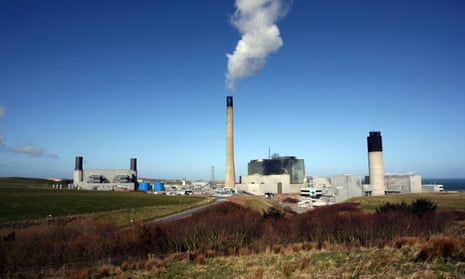The UK government has cancelled its £1bn competition for carbon capture and storage (CCS) technology just six months before it was due to be awarded, breaking a pledge in the Conservative party’s election manifesto.
The abandonment of a technology championed by David Cameron and seen as vital in tackling global warming will be an embarrassment to the UK, just days before a major UN climate change summit in Paris. Industry figures called the move “devastating”, while experts said it would make meeting the UK’s binding carbon cuts “almost impossible” and more expensive.
Two projects had been in the running to build plants demonstrating CCS at commercial scale. One was backed by Shell and SSE at Peterhead. The White Rose consortium was based at Drax, the UK’s largest power plant, but was in trouble after Drax halted its investment in September.
The government informed the London Stock Exchange at 3pm, stating: “Following the chancellor’s autumn statement, HM government confirms that the £1bn ring-fenced capital budget for the CCS competition is no longer available. We will engage closely with the bidders on the implications of this decision for them.” The decision was not mentioned in Treasury documents.
“This is devastating,” said Luke Warren, chief executive of the CCS Association. “Moving the goalposts just at the time when a four-year competition is about to conclude is an appalling way to do business. It is a real blow to confidence for companies investing in CCS. This technology is critical for the UK’s economic, industrial and climate policies.”
Shell said the Peterhead project was now dead and its CCS work would be focused in other countries. “Shell remains committed to CCS – as our involvement in demonstration projects in other parts of the world shows – and we view it as an important part of a low-carbon energy future,” said a spokesman.
CCS traps the carbon dioxide from coal and gas power plants and buries it underground so it cannot warm the climate. The UN’s Intergovernmental Panel on Climate Change concluded CCS is hugely important to tackling climate change in the most cost-effective way. Without CCS, the costs of halting global warming would double, the IPCC said.
The UK government’s own advisors, the Committee on Climate Change, agreed and said in October: “CCS is very important for reducing emissions across the economy and could almost halve the cost of meeting the 2050 target in the [UK’s] Climate Change Act.”
The Conservative’s 2015 general election manifesto said: “We have been the greenest government ever ... committing £1bn for carbon capture and storage.” Lisa Nandy, Labour’s shadow energy secretary, said: “CCS offers huge economic opportunities for Britain. Year after year the prime minister has personally promised to support CCS, so this is a huge betrayal.”
Claire Jakobsson, at EEF, the manufacturers’ organisation, said CCS could save the UK £32bn a year by 2050 and abandoning the competition was a false economy: “In choosing to save a relatively small sum of taxpayer money in 2015, the government is unnecessarily committing vast amount of future energy consumers’ money.”
The UK’s energy policy was reset on 18 November and aims to build many new gas-fired power stations. To meet carbon targets, any new stations would have to stop generating by 2030 unless CCS is fitted, but the cancellation of the CCS competition makes this less likely.
“If we are serious about building a clean and secure energy sector we need a diverse energy system, and CCS is central to this,” said Jenifer Baxter, at the Institution of Mechanical Engineers. “Without CCS this will mean we are locking ourselves into relying on unabated fossil fuel power for generations to come.”
George Osborne’s autumn review and comprehensive spending review also cut spending on home energy efficiency by £132m - an 83% reduction - on the same day that over 40,000 excess deaths were announced for the last winter. The UK has some of the worst housing in the EU and improvements in efficiency are needed to meet carbon targets. Another £700m - 40% - was cut from a scheme supporting green heating.
The chancellor announced a doubling of investment in energy research and technology over five years. He singled out mini nuclear reactors - called small modular reactors (SMRs) - as a promising technology for the UK. Foreign SMR companies have been courting the UK in recent months.
The spending review pledged “at least £250m over the next five years in an ambitious nuclear R&D programme that will revive the UK’s nuclear expertise ... This will include a competition to identify the best value SMR design for the UK. This will pave the way towards building one of the world’s first SMRs in the UK in the 2020s.” A new large nuclear power station at Hinkley Point is set to receive billions in subsidies.
“The chancellor is slashing renewables and energy efficiency investment, and eliminating CCS funding, making it almost impossible to meet our carbon budgets,” said Sepi Golzari-Munro, at climate policy thinktank E3G. “Rather than building the low-carbon infrastructure fit for the future, he has doubled down on building the infrastructure of the past.”

Comments (…)
Sign in or create your Guardian account to join the discussion